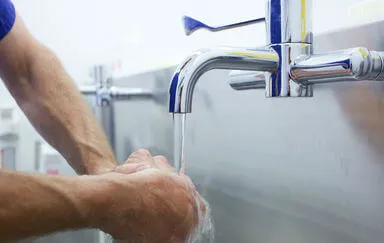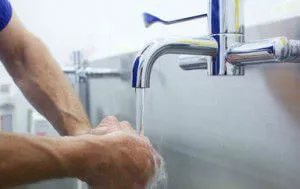
- Share on Facebook50
- Share on Pinterest
- Share on Twitter
Many people revere doctors and other health professionals, and as a result are uncomfortable asking them certain questions.
However, statistics compiled by the Centers for Disease Control and Prevention (CDC), along with the rise of antibiotic-resistant bacteria, make asking practitioners if they have washed their hands an essential question to protecting your safety.
According to the CDC, over one million Americans pick up infections at hospitals, medical offices, outpatient surgery centers and nursing homes every year. Approximately 100,000 of these people die as a result of their infections. Frighteningly, hospital surveys report that staff members only comply with regulation hand-washing procedures about half of the time, on average.
John Jernigan, the director of the CDC’s hospital infection prevention efforts, says, “hand hygiene is probably the most important thing health-care workers can do to protect their patients from infection.” In an effort to encourage patients to speak up, the CDC has distributed 16,000 copies of their “Hand Hygiene Saves Lives” video to hospitals for patients to view upon admission.
Also contributing to the effort is the nonprofit Association for Professionals in Infection Control and Epidemiology, which has mailed posters to 15,000 hospitals around the country encouraging patients to take an active role. Tips include asking hospital staff about hand washing, as well as taking notice of the cleanliness of their hospital rooms, and requesting that they be cleaned if they seem dirty.
A study published in the American Journal of Infection Control found that only 67 percent of patients reported reminding health care workers to wash their hands, usually due to feeling uncomfortable undermining authority and sounding rude. However, 92 percent said that if health care workers were to invite these reminders, they would be more likely to remind them.
Gregory Bump, an associate professor of medicine, says, “there is something about the white-coat barrier that makes them (patients) reluctant to challenge doctors.” He points out that some doctors may be unreceptive or even upset when patients question their hand washing, and that patients are more likely to ask nurses than doctors, although both are equally able to spread infections if their hands are unwashed.
 Some hospitals have started putting up posters and bedside placards that read, “Ask me if I’ve washed my hands.” Some staff members have also started wearing buttons bearing this slogan. Hopefully, these efforts will make enough patients comfortable that eventually, this question will become a normal part of a check-up.
Some hospitals have started putting up posters and bedside placards that read, “Ask me if I’ve washed my hands.” Some staff members have also started wearing buttons bearing this slogan. Hopefully, these efforts will make enough patients comfortable that eventually, this question will become a normal part of a check-up.
While it may seem a bit intimidating at first, next time you visit your doctor, naturopath, chiropractor, acupuncturist, or any other health professional that will be coming in physical contact with you, ask them if they’ve washed their hands directly before seeing you. With the current attention to this important issue, chances are they will appreciate the question.
-The Alternative Daily
Sources:
http://online.wsj.com/article/SB10001424052702303918804579107202360565642.html
http://www.cdc.gov/handhygiene/
http://www.advisory.com/Daily-Briefing/2013/10/02/Hospitals-push-patients-to-ask-Doctor-did-you-wash-your-hands
- Share on Facebook50
- Share on Pinterest
- Share on Twitter

